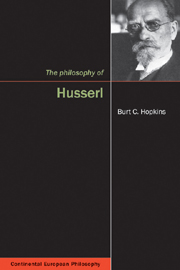Book contents
- Frontmatter
- Contents
- Acknowledgements
- Abbreviations
- Prolegomenon: Husserl's turn to history and pure phenomenology
- I Plato's and Aristotle's theory of eidē
- II From descriptive psychology to transcendentally pure phenomenology
- III From the phenomenology of transcendental consciousness to that of monadological intersubjectivity
- IV From monadological intersubjectivity to the historical a priori constitutive of all meaning
- V The unwarranted historical presuppositions guiding the fundamental ontological and deconstructive criticisms of transcendental philosophy
- Epilogue: Transcendental-phenomenological criticism of the criticism of phenomenological cognition
- Coda: Phenomenological self-responsibility and the singularity of transcendental philosophy
- Notes
- Bibliography
- Index
Prolegomenon: Husserl's turn to history and pure phenomenology
- Frontmatter
- Contents
- Acknowledgements
- Abbreviations
- Prolegomenon: Husserl's turn to history and pure phenomenology
- I Plato's and Aristotle's theory of eidē
- II From descriptive psychology to transcendentally pure phenomenology
- III From the phenomenology of transcendental consciousness to that of monadological intersubjectivity
- IV From monadological intersubjectivity to the historical a priori constitutive of all meaning
- V The unwarranted historical presuppositions guiding the fundamental ontological and deconstructive criticisms of transcendental philosophy
- Epilogue: Transcendental-phenomenological criticism of the criticism of phenomenological cognition
- Coda: Phenomenological self-responsibility and the singularity of transcendental philosophy
- Notes
- Bibliography
- Index
Summary
Introduction
Edmund Husserl (1859–1938) is the indisputable founder of the method of scientific research called phenomenology. Husserl's phenomenology is unarguably the source of one of the two major philosophical orientations of the past century, what today goes by the name of “continental philosophy”. Some seventy years after his death and over a hundred years after the publication of his first major work, however, the scientific significance of phenomenological research remains a matter of dispute and its relation to philosophy, let alone continental philosophy, a matter of intense philosophical debate.
The goal of this book is to introduce the beginner to Husserl's phenomenological research by situating its salient discoveries in relation to traditional philosophy. In particular, the relevance of philosophy to the problems that gave rise to the ancient Greek beginning of the Western philosophical tradition and to this tradition's development in the European beginning of philosophy's modern transformation into universal science will be discussed. This goal is dictated by two interrelated considerations. First, Husserl, by his own admission, “never really studied philosophy, but mathematics and natural science”, and so is not the best authority to speak on the relation of his thought to traditional philosophy. Second, Husserl's lack of authority in this matter has largely allowed his critics to determine the relation of phenomenology to traditional philosophy. And the most prominent of these critics, Martin Heidegger and Jacques Derrida, have done so by claiming that Husserl's phenomenology is philosophically limited by its uncritical adherence to basic and unjustified presuppositions that are datable to early modern (Heidegger) and ancient Greek (Heidegger and Derrida) philosophy.
- Type
- Chapter
- Information
- The Philosophy of Husserl , pp. 1 - 20Publisher: Acumen PublishingPrint publication year: 2010



